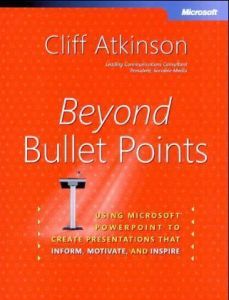Rejoignez getAbstract pour lire le résumé !

Rejoignez getAbstract pour lire le résumé !
Cliff Atkinson
Beyond Bullet Points
Using Microsoft PowerPoint to Create Presentations That Inform, Motivate, and Inspire
Microsoft Press (USA), 2005
Aperçu
Create PowerPoint presentations that score, not bore, using this hands-on manual.
Recommendation
Microsoft PowerPoint changed the world of presentations by simplifying the process of creating a computerized slide show. Alas, over time people started squeezing too much information into every slide and using the preinstalled generic titles. PowerPoint's simplicity let people forget the purpose of presentations: to persuade or to inform without being boring. Cliff Atkinson shows you a creative way to build a good presentation without falling into the PowerPoint template trap – tell a story instead. At present, he provides a free template, storyboard formatter and story guide at sociablemedia.com that adds value to the book, which refers to these resources repeatedly. getAbstract recommends this to anyone who gives presentations.
Summary
About the Author
Cliff Atkinson, a consultant who helps organizations improve communications using PowerPoint, teaches at the UCLA Extension.


















Comment on this summary